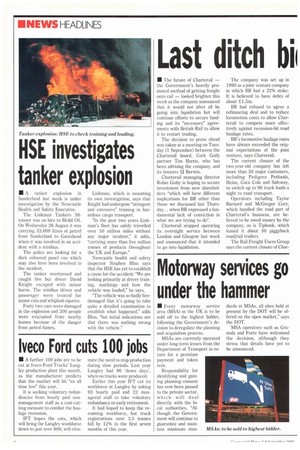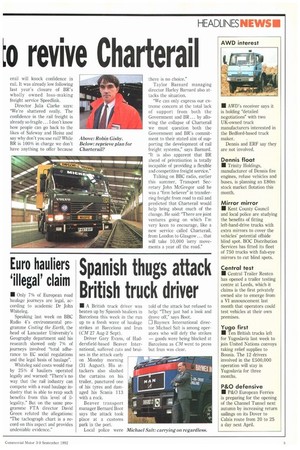Last ditch bii ores revive Charterail
Page 4

Page 5

If you've noticed an error in this article please click here to report it so we can fix it.
• The future of Charterail — the Government's heavily promoted method of getting freight onto rail — looked brighter this week as the company announced that it would not after all be going into liquidation but will continue efforts to secure funding and its "necessary" agreements with British Rail to allow it to restart trading.
The decision to press ahead was taken at a meeting on Tuesday (1 September) between the Charterail board, Cork Gully partner Tim Harris, who has been advising the company, and its lawyers SJ Berwin.
Charterail managing director Robin Gisby is hoping to secure investment from new shareholders "which will have different implications for BR other than those we discussed last Thursday... when BR expressed a fundamental lack of conviction in what we are trying to do".
Charterail stopped operating its overnight service between London and Glasgow last week and announced that it intended to go into liquidation. The company was set up in 1990 as a joint venture company in which BR had a 22% stake. It is believed to have debts of about £1.5m.
BR had refused to agree a refinancing deal and to reduce locomotion costs to allow Charterail to compete more effectively against recession-hit road haulage rates.
BR's locomotive haulage rates have always exceeded the original expectations of the joint venture, says Charterail.
The current closure of the two-year-old company has left more than 20 major customers, including Pedigree Petfoods, Heinz, Coca Cola and Safeway, to switch up to 90 truck loads a night to road transport.
Operators including Taylor Barnard and McGregor Cory, which handled the road part of Charterail's business, are believed to be owed money by the company, as is Tiphook, which leased it about 50 piggyback road/rail trailers The Rail Freight Users Group says the current closure of Char
erail will knock confidence in rail. It was already low following last year's closure of BR's wholly owned loss-making freight service Speedlink.
Director Julia Clarke says: "We're shattered really. The confidence in the rail freight is already so fragile ... I don't know how people can go back to the likes of Safeway and Heinz and say why don't you use rail? White BR is 100% in charge we don't have anything to offer because there is no choice."
Taylor Barnard managing director Harley Barnard also attacks the situation.
"We can only express our extreme concern at the total lack of support from both the Government and BR... by allowing the collapse of Charterail we must question both the Government and BR's commitment to their stated aim of supporting the development of rail freight systems," says Barnard. "It is also apparent that BR ahead of privatisation is totally incapable of providing a flexible and competitive freight service."
Talking on BBC radio, earlier this summer, Transport Secretary John McGregor said he was a "firm believer" in transferring freight from road to rail and predicted that Charterail would help bring about much of the change. He said: "There are joint ventures going on which I'm very keen to encourage, like a new service called Charterail, from London to Glasgow ... that will take 10,000 lorry movements a year off the road."




































































































